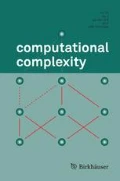Abstract.
We build on the recent progress regarding isomorphisms of complete sets that was reported in Agrawal et al. (1998). In that paper, it was shown that all sets that are complete under (non-uniform) AC0 reductions are isomorphic under isomorphisms computable and invertible via (non-uniform) depth-three AC0 circuits. One of the main tools in proving the isomorphism theorem in Agrawal et al. (1998) is a “Gap Theorem”, showing that all sets complete under AC0 reductions are in fact already complete under NC0 reductions. The following questions were left open in that paper:¶1. Does the “gap” between NC0 and AC0 extend further? In particular, is every set complete under polynomial-time reducibility already complete under NC0reductions?¶2. Does a uniform version of the isomorphism theorem hold?¶3. Is depth-three optimal, or are the complete sets isomorphic under isomorphisms computable by depth-two circuits?¶We answer all of these questions. In particular, we prove that the Berman—Hartmanis isomorphism conjecture is true for P-uniform AC0 reductions. More precisely, we show that for any class \( {\cal C} \) closed under uniform TC0-computable many-one reductions, the following three theorems hold:¶1. If \( {\cal C} \) contains sets that are complete under a notion of reduction at least as strong as Dlogtime-uniform AC0[mod 2] reductions, then there are such sets that are not complete under (even non-uniform) AC0 reductions.¶2. The sets complete for \( {\cal C} \) under P-uniform AC0 reductions are all isomorphic under isomorphisms computable and invertible by P-uniform AC0circuits of depth-three.¶3. There are sets complete for \( {\cal C} \) under Dlogtime-uniform AC0 reductions that are not isomorphic under any isomorphism computed by (even non-uniform) AC0 circuits of depth two.¶To prove the second theorem, we show how to derandomize a version of the switching lemma, which may be of independent interest. (We have recently learned that this result is originally due to Ajtai and Wigderson, but it has not been published.)
Similar content being viewed by others
Author information
Authors and Affiliations
Additional information
Received: September 30, 1999.
Rights and permissions
About this article
Cite this article
Agrawal, M., Allender, E., Impagliazzo, R. et al. Reducing the complexity of reductions. Comput. complex. 10, 117–138 (2001). https://doi.org/10.1007/s00037-001-8191-1
Issue Date:
DOI: https://doi.org/10.1007/s00037-001-8191-1




